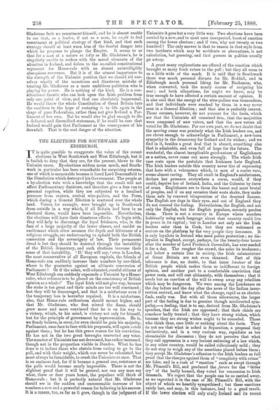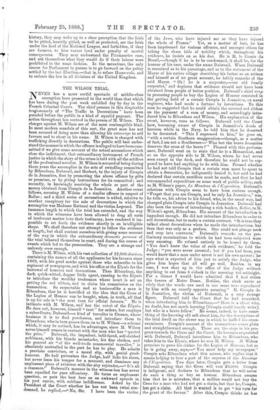THE ELECTIONS FOR SOUTHWARK AND EDINBURGH.
IT is quite possible to exaggerate the value of the recent elections in West Southwark and West Edinburgh, but it is foolish to deny that they are, for the present, blows to the Unionist cause. By-elections seldom mean much, and South- wark in particular has been remarkable for surprising returns, one of which is memorable because it lured Lord Beaconsfield to the Dissolution which destroyed his Government. The people at a by-election vote with a knowledge that the result will not affect Parliamentary decisions, and therefore give a free run to personal caprices, while they are subjected to a localised pressure from orators, central wire-pullers, and the Press, which during a General Election is scattered over the whole land. Voters, for example, were brought up in Southwark from outside in a way which, if all Btitain had been in an electoral throe, would have been impossible. Nevertheless, the elections will have their disastrous effects. To begin with, they will help to discourage the loyal Irishmen, who, in the face of a large majority of the lower classes, and amidst an excitement which often assumes the depth and bitterness of a religious struggle, are endeavouring to uphold both the British connection and the sovereignty of law. Their permanent dread is lest they should be deserted through the instability of the British democracy, and such elections increase their
sense of that instability. If,' they will say, ' even in London, the most conservative of all European capitals, the friends of Home-rule can suddenly increase their numbers by one-third, where is the guarantee against an ultimate conversion of Parliament ? Or if the sober, well-educated, careful citizens of West Edinburgh can suddenly supersede a Unionist by a Home- ruler, what reliance is to be placed on the consistency of British opinion as a whole?' The loyal Irish will not give way, because the stake is too great and their minds are too well convinced ; but they will be discouraged, and that is a misfortune even if the temporary loss is hereafter repaired. It is a misfortune, also, that Home-rule enthusiasm should mount higher, and that Mr. Gladstone, who first stirred the flame, should grow more and more convinced that he is on his way to a victory, which, to his mind, is victory not only for himself, but for the principle of government by representation. He is, we firmly believe, in error, for even should he gain his majority, Parliament, once face to face with his proposals, will again revolt against them ; but he has this grave reason for his conviction. He has not in the two great boroughs converted any voter. The number of Unionists has not decreased, has rather increased, though not in the proportion visible in Dundee. What he has done is to induce those who abstain from voting to go to the poll, and with their weight, which can never be calculated, but must always be formidable, to crush the Unionists at once. That is an ominous fact, for if it became a general one, resistance at the polls would become nearly impossible. There is not the slightest proof that it will be general, nor can any man say what, three or four years hence, the populace will think of Home-rule ; but it is perfectly natural that Mr. Gladstone should see in the sudden and unreasonable increase of his numbers a new and a powerful reason for believing in his success.
It is a reason, too, as far as it goes, though in the judgment of
Unionists it goes but a very little way. Two elections have been carried by a new, and to most men unexpected, burst of emotion among the lower electors ; and if two, why not twenty or two hundred ? The only answer is that to reason in that style from two incidents which may be accidents or aberrations, is not calculation, but guessing, and that guesses in politics usually go astray.
A great many explanations are offered of the emotion which brought so many fresh voters to the poll ; but they all seem to us a little wide of the mark. It is said that in Southwark there was much personal distaste for Mr. Beddall, and in Edinburgh much personal liking for Mr. Buchanan, who,
when converted, took the manly course of resigning his seat ; and both allegations, for aught we know, may be true enough to have affected a certain amount of opinion. It is also said that the energy of the wire-pullers was tremendous, and that individuals were reached by them in a way never seen in a General Election ; and that also is probably correct. Those excuses, however, do not account for the facts, which are that the Unionists all remained firm, that the majorities were composed of new voters, and that the new voters all voted for Mr. Gladstone. For our own part, we do net doubt that the moving cause was precisely what the Irish leaders see, and are clever enough to acknowledge in Parliament, a new-born sympathy in the democracy for Ireland and its wishes ; and we find in it, besides a great deal that is absurd, something also that is admirable, and even full of hope for the future. The wonderful, the almost inexplicable good-nature of Englishmen as a nation, never came out more strongly. The whole Irish case rests upon the postulate that Irishmen hate England. The Irish leaders outside this country never tire of expressing that hate with a vehemence which, to men of a cooler race, seems almost raving. They all exult in England's misfortunes, declare her presence everywhere a curse, would, if they could, deprive her of Ireland, India, and the Colonies by force of arms. Englishmen are to them the basest and most brutal of peoples, and if on any occasion their seats shake, they make them safe by renewed vituperation of the despised Saxons. The English are dogs in their eyes. and out of England they do not conceal the feeling. Nevertheless, the English, and not only the English, but the English populace, serenely pardon them. There is not a country in Europe where seceders habitually using such language about that country could live in peace in its capital ; but in London not only are the Irish leaders safer than in Cork, but they are welcomed as orators on the platform by the very people they denounce. It is only loyalists in Ireland who need police protection ; no dis- loyalist in England, except, perhaps, for the twenty-four hours after the murder of Lord Frederick Cavendish, has ever needed it for a day. The rougher the crowd, the safer its traducers; and below a certain line in society, the Irish calumniators of Great Britain are not even shunned. Part of this tolerance is due, no doubt, to that inner hauteur of the British people which makes them so indifferent to foreign opinion, and another part to a comfortable conviction that power rests, and will rest ultimately, with themselves ; that it needs but an exertion of the will to sweep away any rebellion which may be dangerous. We were among the Londoners on the day before and the day after the news of the Indian insur- rection arrived, and know what the change, rapid as an electric flash, really was. But with all those allowances, the larger part of the feeling is due to genuine though misdirected sym- pathy,—a feeling, that is to say, derived from Mr. Gladstone's speeches, that the Irish are oppressed; that their chiefs are somehow badly treated ; that they have strong wishes, which because they are strong wishes ought to be conceded. Those who think thus, care little or nothing about the facts. They do not see that what is asked is Separation, a proposal they instinctively, and in a very curious way, repudiate as too abominable for discussion ; they do not perceive that what they call oppression is a very lenient enforcing of a law which, in any other country, would be called ridiculously mild ; they do not stop to weigh any of the assertions placed before them ; they accept Mr. Gladstone's adhesion to the Irish leaders as full proof that the charges against them of "complicity with crime" are false, and in a rush of " emotion " such as swept through Mr. Plimsoll's Bill, and produced the furore for the "bitter cry" of the badly housed, they voted for concession to Irish demands. We regret that the people can be so carried away, as we regretted it in the case of Mr. Plimsoll's Bill, with the object of which we heartily sympathised ; but these emotions rarely last, and may, in this instance, lead to a good result. If the lower electors will only study Ireland and its recent
history, they may wake up to a clear perception that the Irish to be pitied, heartily pitied, as well as protected, are the Irish under the heel of the National League, and forbidden, if they are farmers, to hire vacant land under penalty of mortal consequences. They may understand the Fitzmaurice case, and ask themselves what they would do if their labour were prohibited in the same fashion. In the meantime, the only course for Parliament to pursue is to go forward on the policy settled by the last Election,—that is, to refuse Home-rule, and to enforce the law in all divisions of the United Kingdom.







































 Previous page
Previous page